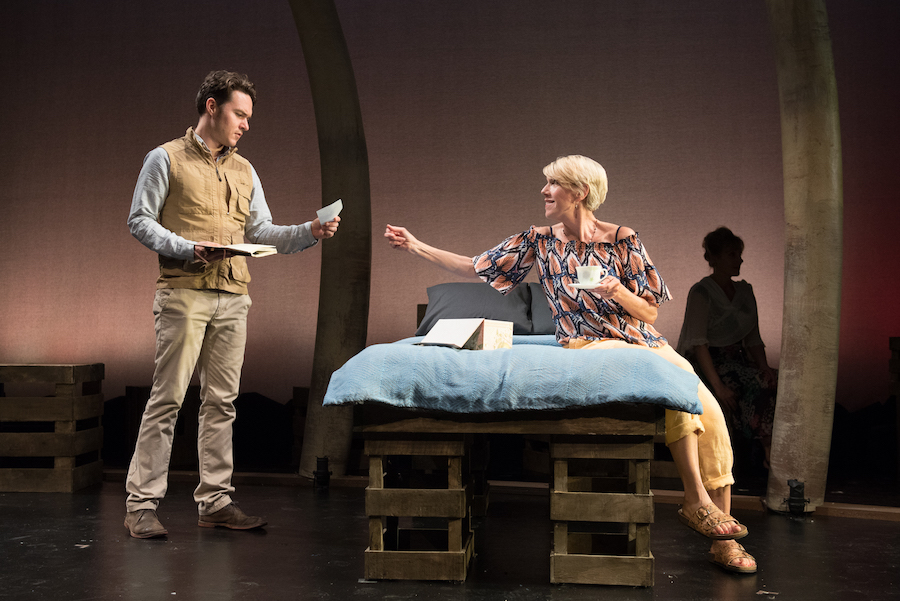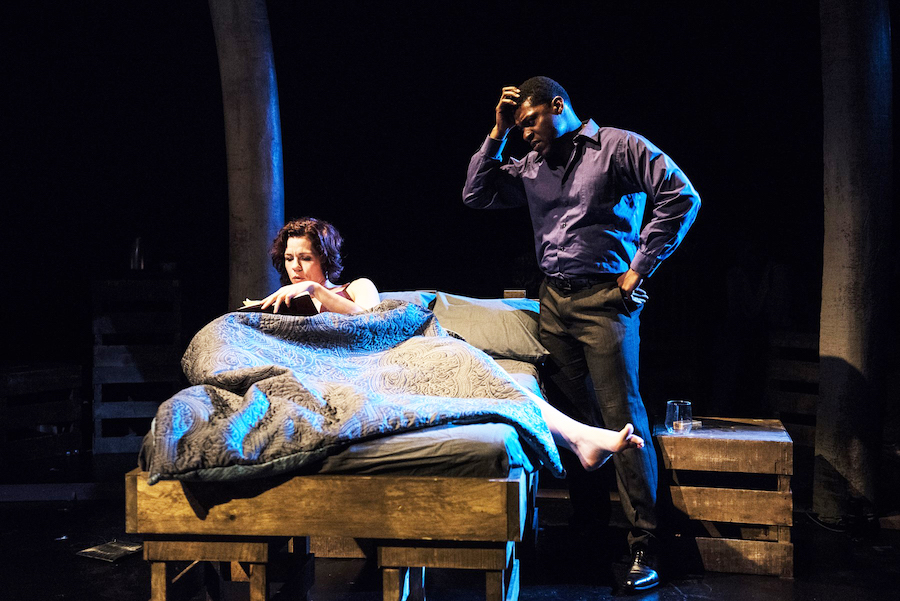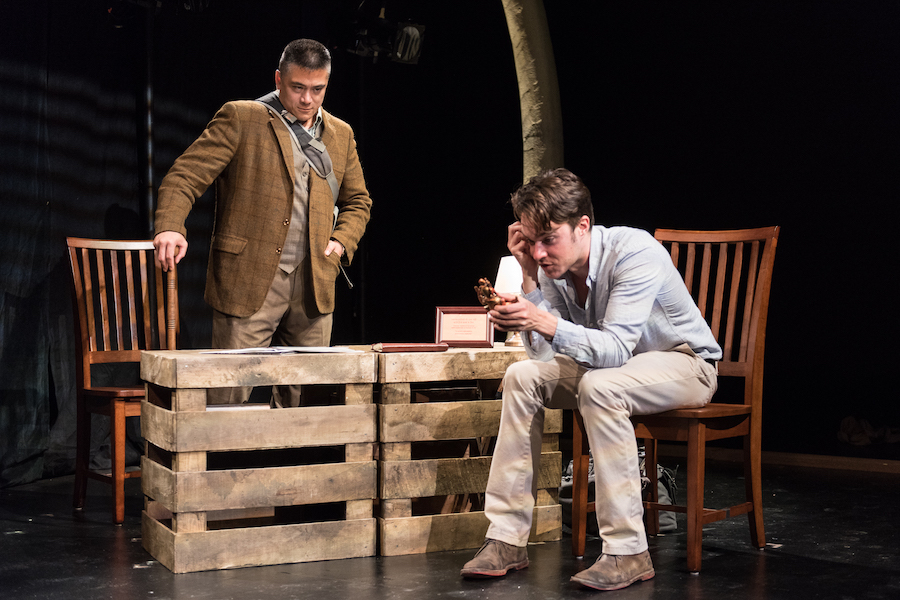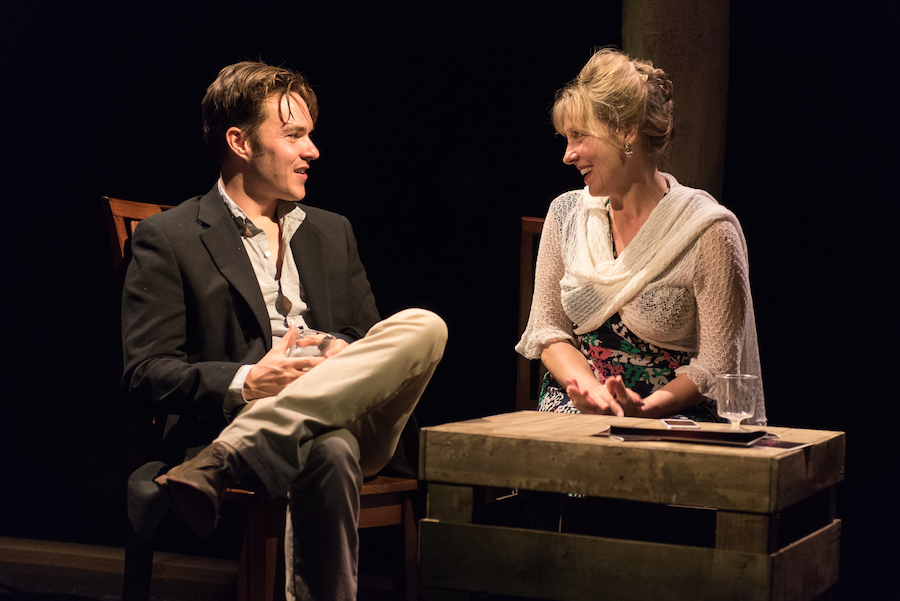by Carole Di Tosti
Memories often erupt from the unconscious without order, apparent logic or rationality. Yet they have a life of their own to incriminate and torment the one who remembers until there is confrontation and expiation. In A Persistent Memory by Jackob G. Hofmann, directed by Jessi Hill Andres currently at Theatre Row, a cacophony of suppressed memories overshadows the protagonist David Huntington (in a fine performance by Drew Ledbetter). Conflicted, he is forced to make a decision to confront them or find a way out of existence to remove their haunting power.
Playwright Hofmann spins his characterization of David through the lens of the catastrophic elephant holocaust. Olivia (Victoria Vance) and Kasem (Ariel Estrada), discuss the brutal poaching and threatened survival with David as he accumulates research on the magnificent animals. Through the passionate lectures of Kasem, an expert in the field of elephant rehabilitation, we discover salient facts about this holocaust that over the decades has decimated a population of four million African elephants to a mere 300,000. Olivia shares her experiences in South Africa of an elephant stampede where children and adults were killed. She suggests that the elephants were provoked to fight back against the overdevelopment of their land, shrinking habitat and threatened extinction of their species which they intuit as imminent.
David listens to adjurations about the elephant annihilation, but initially supports those (i.e. a farmer), who are willing to overlook the destruction for their own benefit. As the play progresses, through the influence of others in his life, he is drawn to the parallels between elephants as sentient beings and humans. He changes his viewpoint as he begins to understand how he himself has endured a childhood holocaust, and like the elephants who must somehow survive, he, too, must cope with painful grief and loss to make it to the next day.
Through the apt direction and fine design team, David’s journey to expiation from his troubled past and haunting explosion of memory unravels in a series of non-linear scenes that take place in varied locations from Uganda, to Manhattan, from Tennessee to Greenwich, Connecticut. The play’s development is beautifully structured by the playwright to symbolize and reveal David’s emotional growth however haphazard because it is relayed by emotional memory. This is cleverly effected by Hill’s superb direction evidenced by her choice of dramatic elements in the production design. The set sports pillars in the shape of elephant tusks which curve to support a horizontal beam as if to suggest the importance of elephants’ vital presence as it intertwines with our own society and the survival of our species. The scene changes (suggested by Hofmann and shepherded by Hill), are adroitly enhanced by the actors’ movements in shadow, back-dropped by the exceptional lighting and sound design/original music. The elements which are evocative and measure the poetic, philosophical concepts intimated in the play raise the themes to a heightened symbolism. It is ingenious crafting.
Through this well thought out production design, we discover snippets of David’s crucial life: the trauma of losing his mother in a cataclysmic devastation and the loss of his brother in an equally traumatic occurrence, as David interacts with those from whom he least expects help. However, all of these individuals (the fine cast includes Lisa Bostnar, Claire Warden, Richard Prioleau, Victoria Vance, Ariel Estrada), provide the ersatz love and guidance that eventually provides the impetus for the horrific memories to surface so that David can finally begin to understand himself and his response to others in his social network. By the conclusion of the play all comes together in a heightened, graceful climax which suggests a powerful resolution in David’s life.
Perhaps the most affecting symbolism is the playwright’s suggested parallel of human existence and elephant existence, their similarity, their interdependence. Humans’ ability to thrive is closely tied in with elephants’ ability to thrive. If one is hampered, so is the other species for, as the playwright infers, our collective memories unite and impact the other. Overall, each species must support the other, not through predation, but through rehabilitation. And if this occurs, both species will heal; if not neither humans nor elephants will escape the consequences.
A Persistent Memory. Through June 18 at the Beckett Theatre at Theatre Row (410 Forty-Second Street, between Ninth and Tenth Avenues). Run time: 90 minutes, no intermission. www.apersistentmemory.com
Photos: Russ Rowland

























